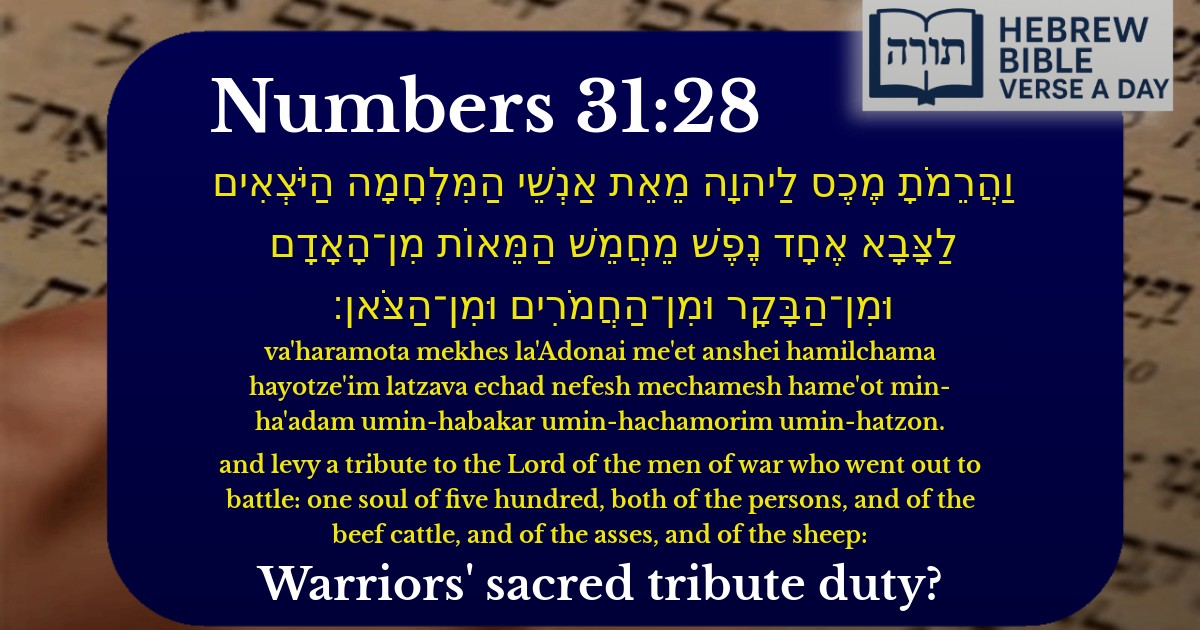Join Our Newsletter To Be Informed When New Videos Are Posted
Join the thousands of fellow Studends who rely on our videos to learn how to read the bible in Hebrew for free!
Hebrew Text
וַהֲרֵמֹתָ מֶכֶס לַיהוָה מֵאֵת אַנְשֵׁי הַמִּלְחָמָה הַיֹּצְאִים לַצָּבָא אֶחָד נֶפֶשׁ מֵחֲמֵשׁ הַמֵּאוֹת מִן־הָאָדָם וּמִן־הַבָּקָר וּמִן־הַחֲמֹרִים וּמִן־הַצֹּאן׃
English Translation
and levy a tribute to the Lord of the men of war who went out to battle: one soul of five hundred, both of the persons, and of the beef cattle, and of the asses, and of the sheep:
Transliteration
Va'haramota mekhes la'Adonai me'et anshei hamilchama hayotze'im latzava echad nefesh mechamesh hame'ot min-ha'adam umin-habakar umin-hachamorim umin-hatzon.
Hebrew Leining Text
וַהֲרֵמֹתָ֨ מֶ֜כֶס לַֽיהֹוָ֗ה מֵאֵ֞ת אַנְשֵׁ֤י הַמִּלְחָמָה֙ הַיֹּצְאִ֣ים לַצָּבָ֔א אֶחָ֣ד נֶ֔פֶשׁ מֵחֲמֵ֖שׁ הַמֵּא֑וֹת מִן־הָאָדָם֙ וּמִן־הַבָּקָ֔ר וּמִן־הַחֲמֹרִ֖ים וּמִן־הַצֹּֽאן׃
וַהֲרֵמֹתָ֨ מֶ֜כֶס לַֽיהֹוָ֗ה מֵאֵ֞ת אַנְשֵׁ֤י הַמִּלְחָמָה֙ הַיֹּצְאִ֣ים לַצָּבָ֔א אֶחָ֣ד נֶ֔פֶשׁ מֵחֲמֵ֖שׁ הַמֵּא֑וֹת מִן־הָאָדָם֙ וּמִן־הַבָּקָ֔ר וּמִן־הַחֲמֹרִ֖ים וּמִן־הַצֹּֽאן׃
🎵 Listen to leining
Parasha Commentary
📚 Talmud Citations
This verse is not quoted in the Talmud.


Context of the Verse
This verse (Bamidbar 31:28) appears in the context of the war against Midian, where Hashem commands Moshe regarding the distribution of spoils. The verse instructs taking a tribute (meches) for Hashem from the soldiers' portion of the spoils—one out of every five hundred captured persons, cattle, donkeys, and sheep.
Rashi's Explanation
Rashi explains that this tribute was given to the Kohanim (priests) as a form of terumah (sacred offering). The ratio of 1:500 is distinct from the standard terumas hamishkan (offering for the Tabernacle), which was 1:50. Rashi notes that this lower ratio (1:500) applies specifically to spoils of war, as the soldiers already risked their lives in battle (Rashi on Bamidbar 31:28).
Rambam's Perspective
Rambam (Hilchos Melachim 8:1) discusses the laws of war spoils and confirms that this tribute was a unique obligation for wars fought under divine command (milchemes mitzvah). He emphasizes that the portion designated for the Kohanim is a recognition of Hashem's role in granting victory.
Midrashic Insights
Halachic Implications
The Sefer HaChinuch (Mitzvah 527) elaborates that this mitzvah instills the principle that material gains—even those acquired through human effort—are ultimately from Hashem. By giving a portion to the Kohanim, the soldiers internalize that their victory was divinely ordained.
Symbolic Meaning
The Kli Yakar (Bamidbar 31:28) suggests that the ratio of 1:500 alludes to the five books of the Torah. Just as Torah is the foundation of Jewish life, the soldiers must recognize that their success stems from adherence to Hashem's commandments.